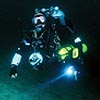Edited by scubahoney, 29 May 2004 - 02:58 PM.

Nitrox Headache anyone?
#1

Posted 29 May 2004 - 02:58 PM
~Jacques Cousteau
#2

Posted 29 May 2004 - 02:59 PM
But rather to skid in broadside, thoroughly used up, totally worn out, and loudly proclaiming--"WOW--What a ride!"
#3

Posted 29 May 2004 - 03:05 PM
~Jacques Cousteau
#4

Posted 29 May 2004 - 04:10 PM
Anyone else have more inf on this?
#5

Posted 29 May 2004 - 09:15 PM
isn't it carbon DI-oxide?? co2 is the normal byproduct of respiration. if there's co in the tank, you got a lot more problems than a HEADACHE!!!!What I've heard is that headaches can be caused by carbon monoxide.
s.honey, i used to get headaches on air all the time. i swore up and down i wasn't skip breathing. i attributed the headache to co2 buildup because of how slow my respiration became under water (for some reason it goes down to like 6-8 breaths/min). then i figured out that breathing 6-8 times a minute is probably accomplished by --you guessed it-- skip breathing. so now i consciously try to breathe a little more regularly (funny...i always tell my patients that breathing is a good thing....)
#6

Posted 29 May 2004 - 10:20 PM
#7

Posted 29 May 2004 - 10:55 PM
--Vince Lombardi
#8

Posted 30 May 2004 - 08:45 AM
Here's my 2 cents worth on this. Besides CO2 buildup, many other factors can be an attirbute to a headache. Some of the things that I have found cause headaches are dehydration, lack of sleep and not eating correctly (low blood sugar). I remember that out at Athens it was getting pretty hot. Were you drinking enough water? That could be a contributing factor (other than partying all night) of your headaches.
AKA - Charlie ...The Keeper of the Angels and the SD Photo guy on trips
If you are Single or Buddyless and looking to dive with other single divers, visit us at http://www.singledivers.com.
#9

Posted 30 May 2004 - 08:49 AM
lack of interest.
all the oxygen in the WORLD won't help you out there!!
#10

Posted 30 May 2004 - 09:13 AM
#11

Posted 30 May 2004 - 10:26 AM
i mean, hell...you're still walking, right??!!
#12

Posted 30 May 2004 - 10:47 AM
It may be a host of other things as well, such as clamping down too hard on the mouthpiece, gas impurities, too much caffeine prior to diving, dehydration, etc. From the little that I know, There are no known connections between nitrox and headaches.
www.jetharness.com
#13

Posted 30 May 2004 - 11:00 AM
For the record:
1.I didn't drink that much! Most of my drink was poured on me (thanks Calvin
2.I drank tons of water, but maybe not enough
3.I didn't dive until late Sat afternoon, after being out Friday night ( I would not have drank at ALL if I were going to dive in the AM..even if I were, the lake was 20ft at the deepest!)
4.I do bite hard on my mouthpiece...is that a nerve thing?
5.I know for sure I don't skip breath, I do breathe way TOO fast though.
All in all, I think everyone is right, and I am glad to know that it wasn't the Nitrox causing my headaches.
Thanks guys.
~Jacques Cousteau
#14

Posted 30 May 2004 - 11:17 AM
Breathe Right And Win -- By Lee Frank
Here is a guide to breathing techniques that can help you when exercising or competing in your next sports activity!
So you want to be Number One - edging out the competition by achieving your absolute athletic best? Well don't hold your breath. Unless you're applying state-of-the-art breath techniques, like those employed by world-class athletes. Just the way a fine-tuned carburetor regulates air into an engine to improve performance, you can precisely control the flow of air into your body - in order to compete at your peak. Here's a practical guide to these techniques, revealed by champion athletes and their trainers.
Running: Breathing techniques are very specialized, because even athletes within the same sport, but competing in different events, have different breathing requirements. Unlike distance runners, sprinters aren't aiming for aerobic fitness. "Someone who runs the 100 meter dash may want to take one breath and go," says Bill Dellinger, head coach of the University of Oregon men's track team and Olympic runner in 1956, 1960, and 1964, when he won the bronze. "For anything longer than 100 meters, you want to breath in for a four-count and out for a four-count. If you're running faster, it might be a three count. If you're running faster than that, a two. The rhythm is even, so that you're not panting. In order to suck down enough air, you need to breathe through both your nose and mouth. And when you exhale, you puff out your cheeks. You do this so you can retain some residual air which you need in order to have a better exchange of oxygen."
World-renown Brazilian track coach Luiz De Oliveira has trained champion runners like Mary Decker and Olympic gold and silver medalist, Joaquim Cruz. De Oliveira claims his breath-holding drill allows middle and long distance runners to improve their endurance by adapting to increased levels of lactic acid. "I have a breath-holding drill that I use once a week," says De Oliveira . "I try to drive the lactic acid up quicker than it would in a regular race. That way, my runners get used to it. What I have them do is take a running start, then inhale and hold their breath when they hit the starting line, then they run for 25 meters. They work on technique while holding their breath. When they reach the finish line, they exhale and breathe normally."
De Oliveira then has them jog back and do the same drill for 30 meters, then 35 - all the way to 90 meters. "Everybody's capable of holding their breath for a very long time. But you've got to do three of these sets. By the final set, you're going to become very very tired. It's hard to hold your breath at that point. But if you use my drill, you will see results."
De Oliveira has another drill where his 400 and 800 meter runners hold their breath for just the last 30 meters, simulating the end of a race when they're most tired. At this point, they have to pick up their speed and work on their form. "The most important thing you can do in the race," says De Oliveira, "no matter how exhausted you get - is to maintain your form."
Swimming: Breath training is trickier when it comes to swimmers, since their breathing pattern is regulated by when, during the strokes, the swimmers breathe. Typically, swimmers try to inhale every three or four strokes. Jane Cappaert, a sports science biomechanist with the Olympic swimming team, says that swimmers will improve their training by staying underwater for as long as they can. "It will help them maximize their oxygen consumption from each breath," explains Cappaert. "This is called hypoxic training. And it seems to translate into better performance when a swimmer is low on oxygen during a race."
Cappaert says the way to train for this is to swim underwater, push off from the pool's wall on your back, doing a dolphin kick. "Keep your arms overhead, torpedo-style. Once you're able to make it to the other side, try increasing your speed. Sprinters train by holding their breath 25 yards, flip turning, then coming back 25. Another hypoxic exercise is to swim freestyle, holding your breath for six strokes, then increasing it to seven, on up, in order to put you in that hypoxic state."
Tennis: "Tennis is a lot like basketball," says USTA coach Nick Saviano. "You're not only working hard physically, but you require fine motor skills. So breathing becomes particularly important in controlling your heart rate and recovering. Your goal is to be in your optimum physical state to execute your next point." Saviano has worked with most of the top American pros, including Jim Courier, Todd Martin, and Michael Chang.
"A match at the French open might mean five hours of intense competition," says Saviano. But even if you're just playing a weekend match with the guys, Saviano says the key to winning is recovery, what you're doing between points to prepare you to win the next one. "A smart player is going to make use of this time. You should take some very deep breaths, easy and even, not forcing any air in or out. At the same time, focus in on a small object. This concentration, combined with your breathing, will bring you heart rate down - so you'll relax and play with your best coordination. Experienced players often focus in on their strings. You ever notice that the pros are looking at their rackets all the time?"
Saviano recommends a breath technique to use when you hit the ball: "Blow out a deep breath on contact," he says, "like you're blowing-up a balloon. Some players actually grunt. This helps your muscles relax and also increases your power." Saviano points out this technique is borrowed from karate where it is similarly used to release explosive energy.
Do breath-holding techniques have a place in tennis? Saviano says that when you hold your breath, your muscles tighten up and your coordination turns to mush: "Holding your breath in tennis is a sure-fire technique for poor performance."
Weight-lifting: "I've watched people hold their breath while doing squats or overhead presses," says Lee Haney, former Mr. Universe and Mr. Olympia. " And I've seen these people become dizzy, get nose bleeds, and even pass-out. There's no oxygen going to the body when you hold your breath, so I never recommend it."
"Working with weights, the technique that should be used when doing any type of pushing movement, is to exhale as you thrust and inhale during the negative part of the movement. With pulling exercises, it's just the opposite: exhale on the pull. Just remember to exhale on the exertion, pushing all your breath out from deep down, much like in karate when you go to strike an opponent." The one exception to this rule, according to Haney, are exercises that have a very slow movement and don't call for much energy. "For example," he says, "seated concentration curls. It doesn't matter how you breathe, as long as you don't hold your breath. But anytime you're going to have to spend a lot of energy, anytime you have to grunt to complete the movement - the breathing technique must be correct."
Scuba diving: "The one breath technique I know a lot of civilian divers do is skip breathing," says Navy SEAL's diving instructor, Lieutenant Mike White. "They'll breathe deeply, then hold their breath to conserve air. Holding your breath is something you never ever want to do." If these divers change their depths by even a few feet," White darkly warns, "the compressed air they're breathing will expand and can rip a hole in their lungs where it will bubble into the blood stream and possibly kill them."
So what is the most important muscle in the body for a diver?
It is the diaphragm, the muscle that makes the lungs work. It takes strength and energy to suck air through any regulator. More importantly though, breathing changes a divers buoyancy and so moves them up and down in the water. This takes effort too, especially when breathing on the surface when it can become a critical issue.
The diaphragm can be exercised like any other muscle, but there is a lot more to it than that. The diaphragm is part of what the martial artists call the 'chi'. The chi (usually pronounced 'key') is the conduit through which all muscular strength in the body is channeled. The swimmer's legs are anchored against the muscles that make up the chi. A strong swimmer with a strong chi can also channel the strength of their stomach, back and diaphragm to their swimming. A martial artist is taught that the power of their punch (kick) must originate with their chi.
Breathing... Breathing is good for a diver
There are things you can do to conserve air and there is always the issue of skip breathing, but there is also life breathing. There are things you can do with your breathing to keep you alive when nothing else will. This is an important lesson, even if it might seem a bit odd. And it works, powerfully. How do I say it?
If you take up a martial art, music, dance or any number of other sports, you will be told the overwhelming importance of breathing and controlling ones breathing. This context of breathing doesn't get much mentioned in scuba classes. I can tell you how to learn it and what it can do for you, but the reason it works is still mostly a guess to me, but I do know how useful it is. There may be other ways to accomplish this, but if my guess is correct, this is the easiest and best way.
Essentially it's this. Associate a word or words with your breathing. It doesn't even have to be out loud. On inhale, I say "oh" (which is actually hard to say out loud when inhaling) and on exhale I say "ho". Complicated, isn't it. Now do this for a minute or five, while concentrating on doing relaxed, full breathing. In ways, it is like meditating. Like other things to be learned, it takes practice and repetition, but after a while it becomes programmed in. It is not a trick. It is just training through repetition and concentration.
Why in the world would you do this? Well, say I am bicycling hard. For many people, maybe most, what tires and fails first is actually the breathing, not the legs. If you learn this controlled breathing, you can change to it and it will be the legs that give out first and maybe not near as soon as they would have. So how does this help diving? Take it from me, when you are right there at the edge, this can save you. In waves or currents, when you are struggling or perhaps even in danger of losing consciousness, it can give you back control. If you do a sprint underwater and overbreathe your regulator or just overheat, it can get you back in control.
Actually, it can do far more for you than that. My guess is that partly how it works relates to the odd fact that breathing is one thing that can be controlled either automatically or consciously. Words are something that can be handled only by the conscious mind. (Go left. Go right.) Associating words with breathing forges a link between the conscious mind and the body. More than breath control, it leads to an awareness of your body functions and status. It is something that will serve you at far more than diving or other sports, including if you find yourself quite ill and weakened.
Controlled breathing teaches self control of the body and mind. It's potential is great if you want to pursue it. Oh, I'm sorry. Your instructor did explain all that in AOW. Oh well... then just forget I said it.
I will mention here, that you can carry this too far. With this skill well developed, you can just stay down too long. It's a case common to diving though, if you're pushing to the edge, you're blowing it anyway. Really though, I don't worry about people making mistakes too much though, because by the time you learn to really use the potentials of this, you will probably have learned enough to not do something too stupid with it. Still it is a hypnotic based skill and you can over extend your body in a number of ways if you want, including straining muscles and joints. I even learned how to release adrenaline while sparring... Gives your partner a real thrill. You can do the same thing without this method of training. Also, it's a bit like a martial art. You can learn to be a very dangerous person, but much of learning to fight well, is actually learning control. In diving, competition and life, it makes you less likely to be careless of the skills you do learn.
While on the topic of breathing, here are a couple of other thoughts. Being able to extend bottom time is generally considered the mark of a good diver. It indicates that they are relaxed, controlled, physically fit and that their body has adapted.
There are also methods a diver can learn to extend their air such as exhaling slowly. Skip breathing is a common issue. It is when a diver holds their breath between inhales and exhales or between exhales and inhales. It is considered risky for a few reasons and causes headaches for many divers. Still, in ways, that is what every experienced diver does.
A thing to remember though is that, usually, a diver is an athlete participating in a demanding sport. Sometimes we are slowly swimming in calm water, but if there is a current or the diver is swimming at all fast, they are doing a fair amount of physical exertion. That is not a good time to be restricting ones breathing. As a matter of fact, it is antithetical to the heightened physical activity. The point of all this is that conservation of air is a good idea and a fine goal, but should certainly not be carried too far. For a hunter who solo dives, like myself, it is certainly not a good idea. One of the things I do for safety is try to breathe naturally. It does not conserve air, but it is one thing I can do to reduce certain risks.
Once you learn to breathe with your diaphragm, practice it all the time until it becomes a reflex.
There is a breath technique that is often confused with skip breathing. This is when divers wear very little weight but rather use their lungs to control their buoyancy. At full capacity, your lungs carry six to eight pounds of floatation, so by adjusting the amount of air you breathe, you can regulate you depth. Breathe in more deeply and you'll increase your buoyancy; breathe in less, and you'll submerge. The major technique for conserving air underwater is to breathe in as relaxed a mode as you can. Remember that breathing air underwater is different than breathing air on the surface. As you dive deeper, the density of the gas increases so you'll be working harder to breathe unless you're employing long, slow breaths . Says David Taylor, PADI Dive Master and Nitrox and Technical Diver, "That's something people don't usually catch on to until 40 or 50 dives."
Tom Mount, president of the International Association of Nitrox and Technical Divers, recommends doing a t-ai chi breath exercise: breathing in for six to eight seconds, a natural two or three seconds pause, then exhaling for six to eight seconds. "While you're doing it," Mount says, "concentrate on breathing with your diaphragm. This is the way we were born breathing. But we lose it through bad habits and our cultural upbringing. You go to school and they say, 'Chest out, shoulders up, stomach in,' that destroys diaphragmatic breathing." Mount suggests this exercise: Lie on your back, putting one hand on your chest and the other on your stomach. As you breathe, make sure your stomach rises and not your chest. "Once you learn to breathe with your diaphragm," says Mount, "practice it all the time until it becomes a reflex."
Diaphragmatic breathing is the only way to get air into the lower third of your lungs, which is where two-thirds of the blood supply is. This breath technique will increase the efficiency of your lungs. It will enhance your ability to metabolize oxygen. Breathe with your diaphragm - and you'll improve your performance and endurance in any sport.
Hope this will help. It did for me a LONG time ago.
-ZD
But rather to skid in broadside, thoroughly used up, totally worn out, and loudly proclaiming--"WOW--What a ride!"
#15

Posted 30 May 2004 - 01:49 PM
0 user(s) are reading this topic
0 members, 0 guests, 0 anonymous users

















